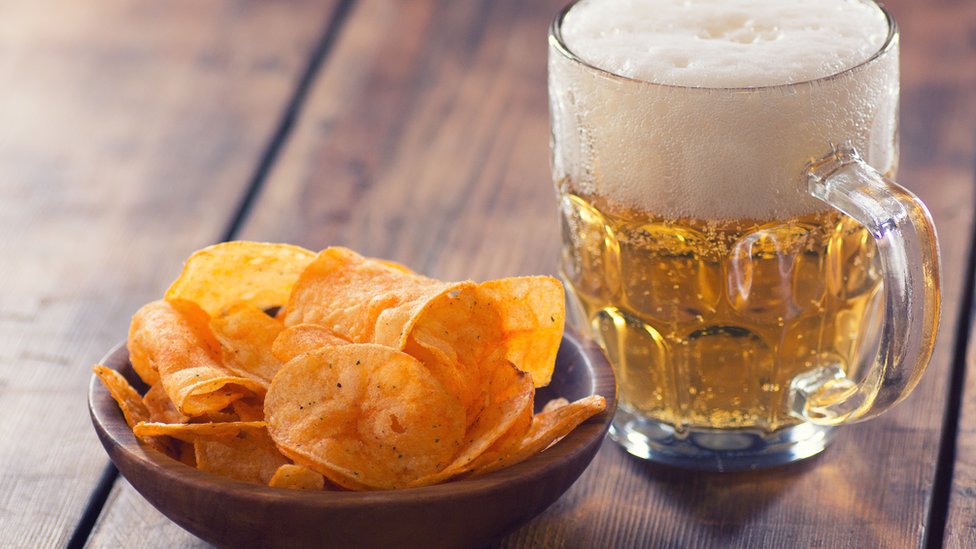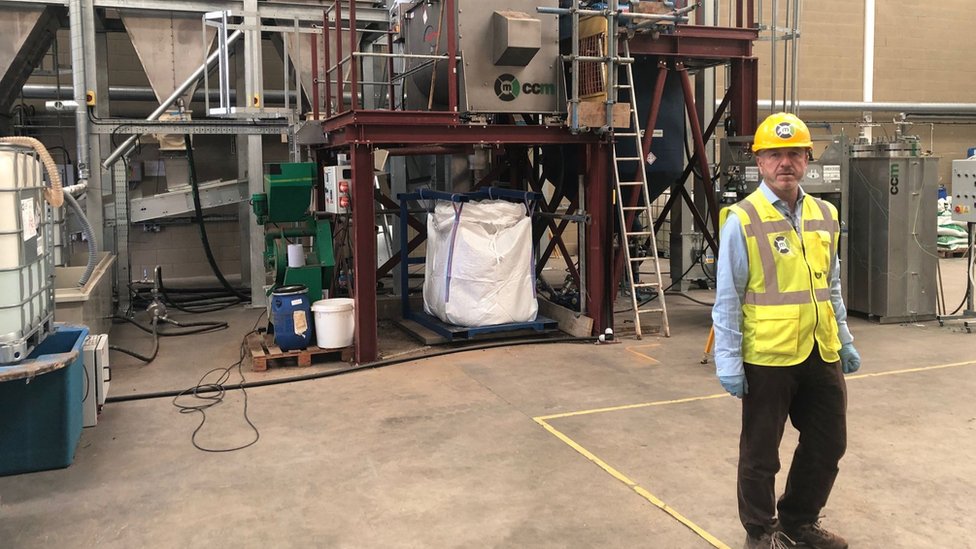Beer and crisps used to help tackle climate change

Crisps firm Walkers has adopted a technique it says will slash CO2 emissions from its manufacturing process by 70%.
The technology will use CO2 captured from beer fermentation in a brewery, which is then mixed with potato waste and turned into fertiliser.
It will then be spread on UK fields to feed the following year's potato crop.
Creating fertiliser normally produces high CO2 emissions, but the technology adopted by Walkers makes fertiliser without generating CO2.
So, the beer-and-crisps combo performs a dual function.
It stops the emission of brewery CO2 into the atmosphere – and it saves on the CO2 normally generated by fertiliser manufacture.
This ingenious double whammy was developed with a grant from the UK government by a 14-employee start-up called CCm.
The fertiliser was trialled on potato seed beds this year, and next year Walkers will install CCm equipment at its Leicester factory to prepare for its 2022 crop.
A decision has not yet been made on which brewery Walkers will work with on this.
The new technology adds to carbon-saving techniques already under way.
The firm has installed an anaerobic digester, which feeds potato waste to bacteria to produce useful methane.
The methane is burned to make electricity for the crisp-frying process – so this saves on burning fossil fuel gas.
The new system will go a step further by taking away potato “cake” left after digestion - and stirring the brewery CO2 into it to make an enriched fertiliser which will help put carbon back into the soil as well as encouraging plant growth.
It’s an example of scientists finding ways to use CO2 emissions which otherwise would increase the over-heating of the planet.
Zero emissions target
The CCm technology falls into the industrial category of Carbon Capture and Usage (CCU).
Related inventions are already being harnessed in novel ways to create fuels, polymers, fertilisers, proteins, foams and building blocks.
CCU is currently at a tiny scale, though - partly because the technologies are new, and partly because production of waste CO2 from society vastly outweighs demand for it.
CCU is a sister technology to the better-established Carbon Capture and Storage (CCS) which catches emissions from chimneys, compresses them and pumps them into underground rocks where they can’t heat the climate.
The prime minister is keen on CCS, which can be used on a large scale.

Katy Armstrong, manager of the Carbon Utilisation Centre at Sheffield University, previously told BBC News: “We need products for the way we live - and everything we do has an impact.
"We need to manufacture our products without increasing CO2 emissions, and if we can use waste CO2 to help make them, so much the better.”
Many of the young carbon usage firms are actually carbon-negative: that means they take in more CO2 than they put out.
These firms are pioneers in what’s known as the circular economy, in which wastes are turned into raw materials.
The EU is trying to prompt all industries to adopt this principle, because firms will need to emit zero emissions by 2050.
Walkers brand owner, PepsiCo, is looking to extend the CCm project by feeding oats and corn with the “circular” fertiliser.
'Baby steps'
David Wilkinson from PepsiCo’s said: “This innovation could provide learnings for the whole of the food system, enabling the agriculture sector to play its part in combating climate change.
“This is just the beginning of an ambitious journey, we’re incredibly excited to trial the fertiliser on a bigger scale and discover its full potential.”
CCm says it produces CO2-based fertiliser at roughly the same price as the conventional product.
CO2 from the production of conventional fertilisers has been a large factor in keeping emissions from agriculture static as most other emissions across society have been falling.
Peter Hammond from CCm told BBC News: “There has been an increase in public awareness that we should get something done about the climate – and lot of baby steps have come together to make something significant.
“The key challenge for us as a business wasn’t getting down the cost – it was marketing the fertiliser. This link with PepsiCo takes care of that for us.”
PepsiCo has a mixed record on the environment.
It has long been among the leaders in tackling carbon emissions, and it recently committed to eliminating all virgin plastic from its bottles sold in nine European states by 2022.
But a recent survey from by the Break Free From Plastic Campaign ranked it second highest (after Coke) in the amount of plastic pollution it creates.
Some environmentalists consider Pepsi to be among the symbols of the throwaway culture, with its plastic waste found in 43 countries.

December 07, 2020 at 03:37PM
https://www.bbc.co.uk/news/science-environment-55207597
Labels: BBC News

0 Comments:
Post a Comment
Subscribe to Post Comments [Atom]
<< Home